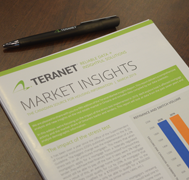 Friday, March 29, 2019 was an insightful day indeed.
Friday, March 29, 2019 was an insightful day indeed.
The first Teranet Market Insight Forum of 2019 was on at the MaRS Discovery District, featuring a roster of speakers who shared great insights into the Canadian real estate economy.
The Forum was an opportunity for Canadian financial and real estate professionals to better understand the market and plan for innovation and change.
“We are focused on delivering insights and data through various channels and partners to help businesses make better decisions and to help their end customers,” said John Robinson, Teranet Vice President of Commercial Solutions.
“We’ve invested in a large team of data scientists and tools and the latest technologies to bring these insights forward.”
Stéfane Marion, Chief Economist and Strategist at the National Bank, flew in from Montreal for the Market Insights Forum. He spoke about what’s to come for the Canadian economy in 2019.
The biggest threat to the Canadian economy, Marion said, is coming from outside of the country. Trade wars and commodity prices are two external risks that affect Canadians.
Marion also cautioned against comparing the economies of Canada and the U.S.
“You can’t compare two countries unless you adjust for the social safety net,” he said. “We [Canadians] are not worse off than the U.S. when you adjust for social safety.”
The housing sector in Canada is also much different from that in the U.S., said Marion. For example, the three-month moving average of starts for multifamily units as a percentage of total is 68% in Canada, versus a 31% average in the U.S.
And when we look at housing affordability across the world, home prices do not seem as extreme in Canada. For example, in Hong Kong, the price per square foot in USD for downtown living in the summer of 2018 was $2,858. But in Vancouver it was $770 in the same time period and in Toronto, it was $708.
As for consumer solvency, while Marion said that softening household credit has made many nervous, the originations to highly indebted borrowers are declining. The share of new mortgages with a loan-to-income ratio above 450% decreased in 2018. Lending standards are also not a source of concern, he said, as the share of mortgages origination with low credit scores (less than 620) also declined.
In conclusion, Marion said:
- There has been a global growth of just under 3.5% in 2019.
- China continues to grow at around 6% with a different mix.
- Geopolitical risks remain an issue, but Marion still expects common sense to prevail.
- In Canada, we should expect to see slower growth in 2019 but the economy remains resilient.
- Canada also has the “best immigration policy in the world” and is very well positioned to adapt to demographic/technological changes.
- Marion estimates interest rates to remain low for the foreseeable future.
- USD is not expected to surge in 2019.
Roger Vandomme, Chief Data Scientist at SMC, took the podium after Marion to present about the role AI and Human Decision Making has to play in the real estate market.
The most difficult part of decision making, Vandomme said, is uncertainty of the future. And even when we have all the analysis and data in the world, that uncertainty can still linger. However, with technology available such as AI, machine learning, predictive modelling, and more, there is opportunity to automate some of the decision making, or at least gather data much easier than ever before.
In real estate, AI applications might look like:
- Using an Automated Valuation Model (AVM) such as the AVMs provide by Teranet.
- Predicting future rent and disposition prices.
- Telling real estate investors what properties off the best return.
- Pinpointing opportunities with risk/reward ratio.
- Locating and exploit market anomalies.
- Making perfectly timed renovation decisions.
- Digital real estate agency, including the probability to sell/buy and prospect matchmaking.
Vandomme also alleviated some common fears associated with AI, such as that AI-programs will take over humans (he referenced HAL in 2001: A Space Odyssey) and that AI will take away human jobs. In fact, Vandomme said, AI advancement will likely result in the need for new job creation, such as data scientists, data analysts, domain experts, DevOps engineers, and project managers.
After Marion and Vandomme presented, Mark Huttram, Director of Sales and Marketing at Teranet, and Kan Zhu, Leader of Financial Services at Teranet, spoke about upcoming Teranet initiatives, including LendView and PIN Monitoring.
And last, but certainly not least, Michael Pertsis, Director of Mortgage Business, Global Funding, and Treasury at National Bank, presented about the Teranet-National Bank House Price Index. The HPI offers substantial insights for financial executives, particularly when it comes to trend analysis, Pertsis said. That includes year-over-year changes, total returns, and CMA-level data.
Pertis said that HPI users can also view neighbourhood-level data with numbers from roughly 500 different neighbourhoods and property types across Canada.
HPI data is used as a benchmark for many across Canada, including Canadian Covered Bonds.
“The National Bank uses it to manage their own portfolio,” Pertsis said. “Lenders understand how HPI can help them.”
We thank all of our speakers and audience members who attended the March 29 Teranet Market Insights Forum.
For more insights into the Canadian housing market, please see the latest Teranet Market Insights Report: https://www.teranet.ca/commercial-solutions-blog/march-2019-teranet-market-insights-report/.




